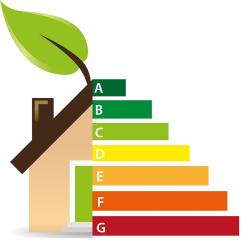
What is an EPC- and why should you care?
Published: 31-05-2023
Energy bills are a hot topic for homeowners and renters across the UK. For many it can be tough to measure exactly how energy efficient their home is and what improvements can be made.
With this in mind, Martyn Bridges, our Director of Technical Services, has offered some insight into the EPC rating, explaining exactly what it is, what it’s for, and how we can improve it.
What is the EPC?
The EPC, or Energy Performance Certificate, is a rating scheme that measures the energy efficiency of a property ranging from band ‘A’ down to ‘G’.
Each evaluated property is given a score between 1 to 100 with a corresponding grading, for example band ‘A’ requires a score of over 92. On the other end, a property rated ‘G’, the worst performing band, means you have scored between 1 and 20.
Typically, the majority of properties tend to be in band D, with some in E. However, newer build properties will usually be in A, B or C.
Why should we want to be in a high band?
Around 20 years ago or so, when this system was first introduced, there wasn't a great deal of interest in rating your property’s energy efficiency. But with the price of gas and electricity reaching record highs, the appeal of a more energy efficient home has increased dramatically. Fuel bills are said to be maximized at an average of £2,500, when in reality it's even more than that.
The benefits of having a home that has a high EPC rating is not only in the savings you can make due to an energy efficient home, but it also adds to the price value of a property on the market.
There are proposals to have every property, or as many as possible in the UK, at a minimum of band C by 2035.
What can homeowners themselves do to increase their EPC score?
It's a legal requirement when you intend to sell your property to have an EPC rating undertaken by a qualified energy assessor. Once a property is evaluated, the homeowner receives a report with recommended improvements ranging from simple fixes like roof insulation or more elaborate inclusions like the installation of a solid wall, cavity wall or floor insulation, which is more costly.
They’re not very common nowadays, but if you've got single glazed windows, then replacing those with double glazed windows will guarantee you jump up by one band – for example a band F home can jump to band E by making this change.
Similarly, if you have an old, non-condensing boiler, and you were to replace it with a high efficiency condensing boiler, you will also be guaranteed to jump one full band. There's a number of recommendations you'll learn from your energy rating results, and it will also show you the potential heights you could raise your property to if you undertake these remedial measures.
Are there any other reasons to aim for a high EPC score?
In the near future, there will be a requirement that all houses must have a minimum efficiency rating level. That means home owners won’t be able to sell or rent a property unless they meet these proposed banned figures. There is a proposal that any house that you lease as a landlord must reach band C by 2025 for a new tenant, and by 2028 if it's an existing tenant.
More News

Clean Heat Market Mechanism
On 30th November 2023, the Government published their long-awaited response to the Clean Heat Market Mechanism (CHMM) which as of the 1st January 2024 will become effective with some minor amendments.

Television is the defining sound of the British home in 2023
We have recently conducted some research and have identified the top 20 sounds which make up the soundscape of a household in the UK, whilst debunking myths around ‘noisy’ heat pump technology.





